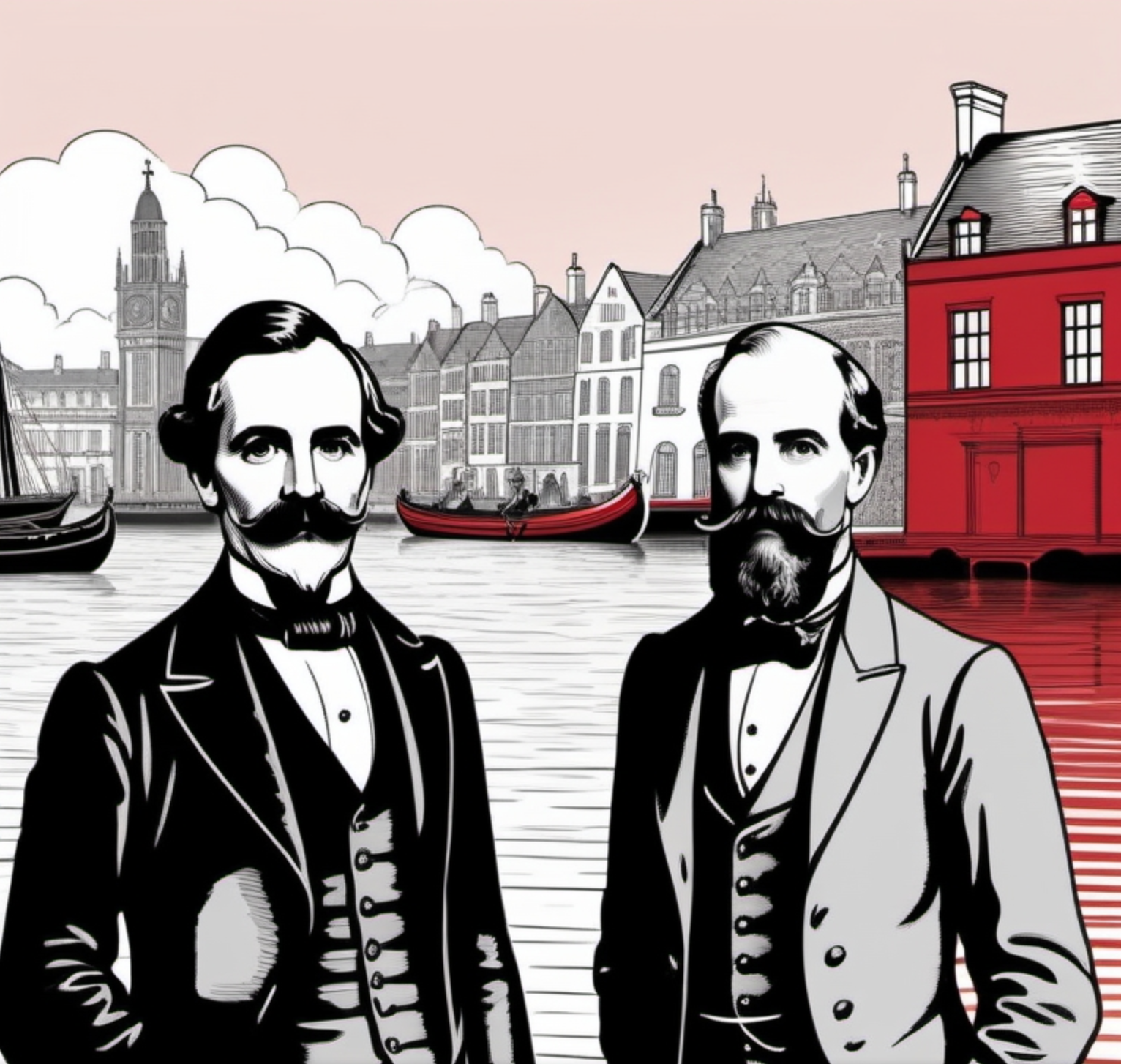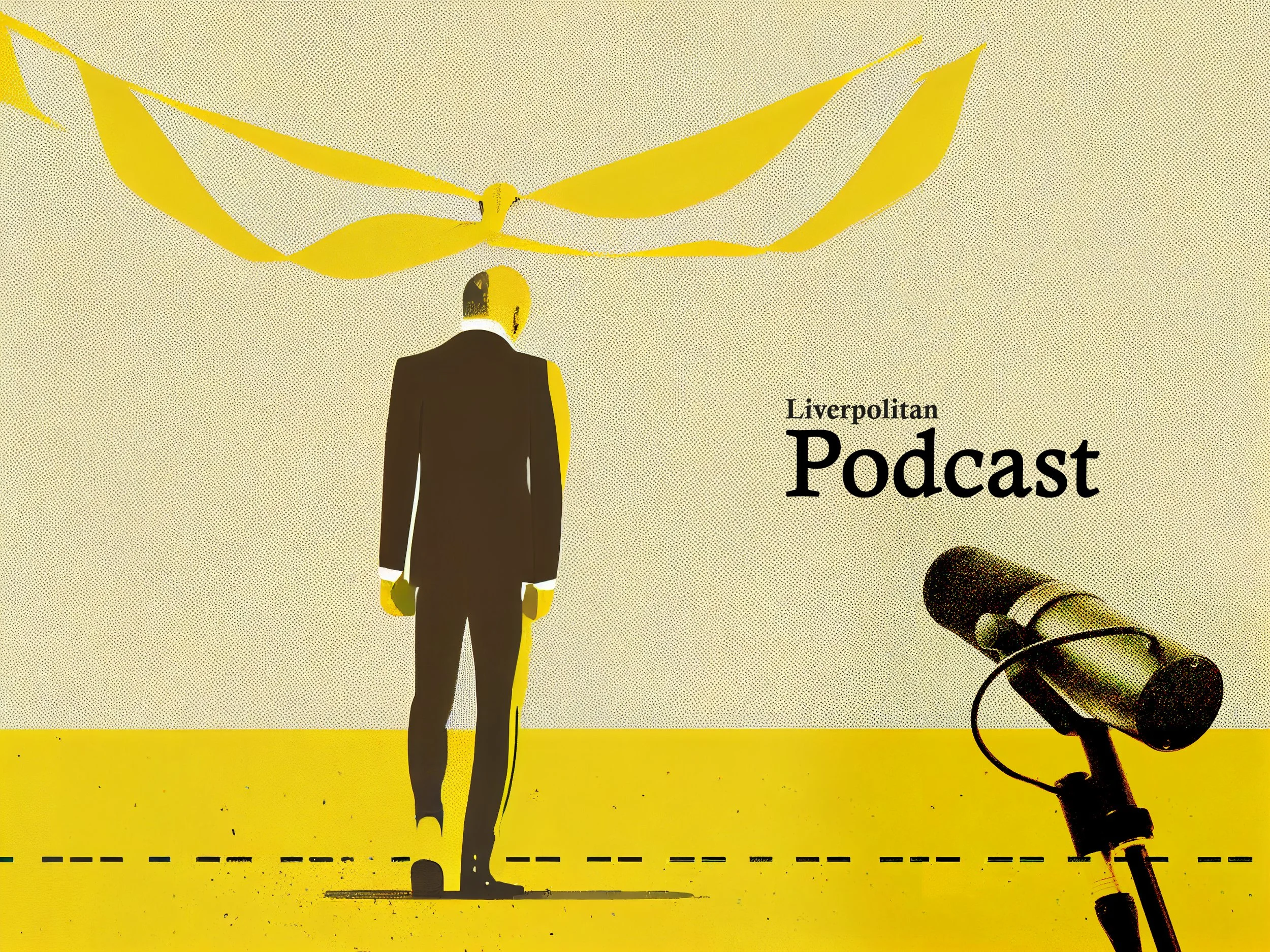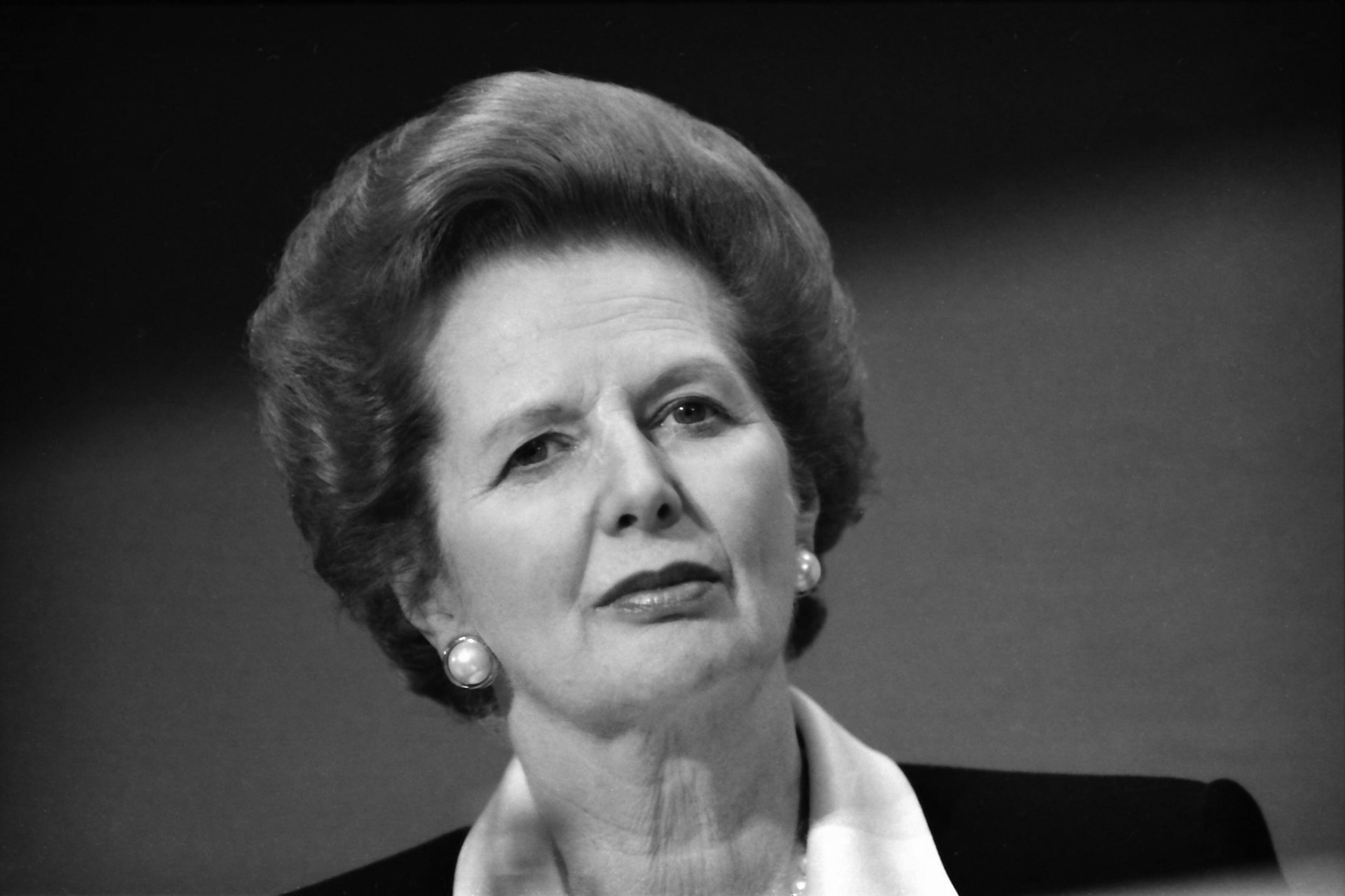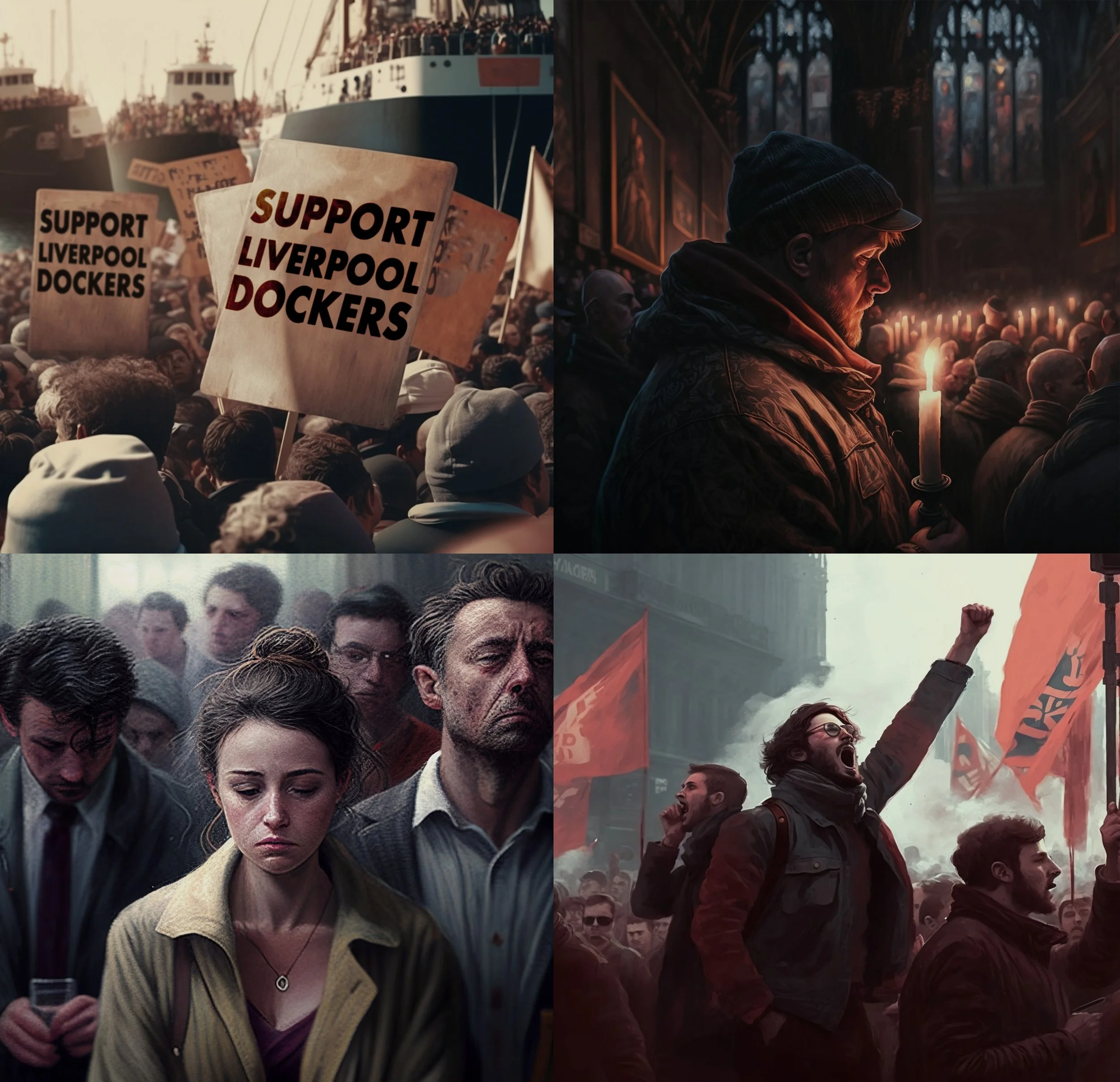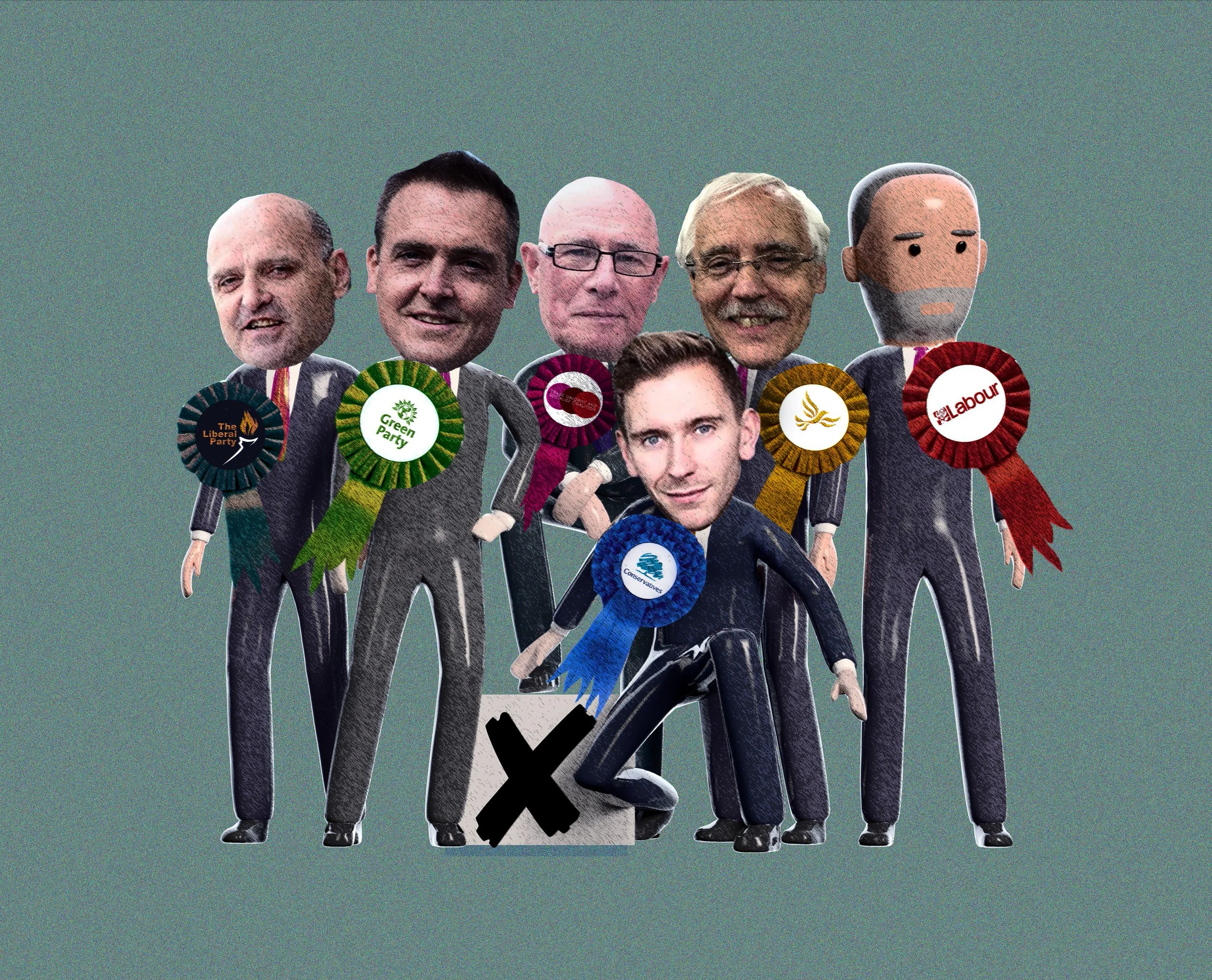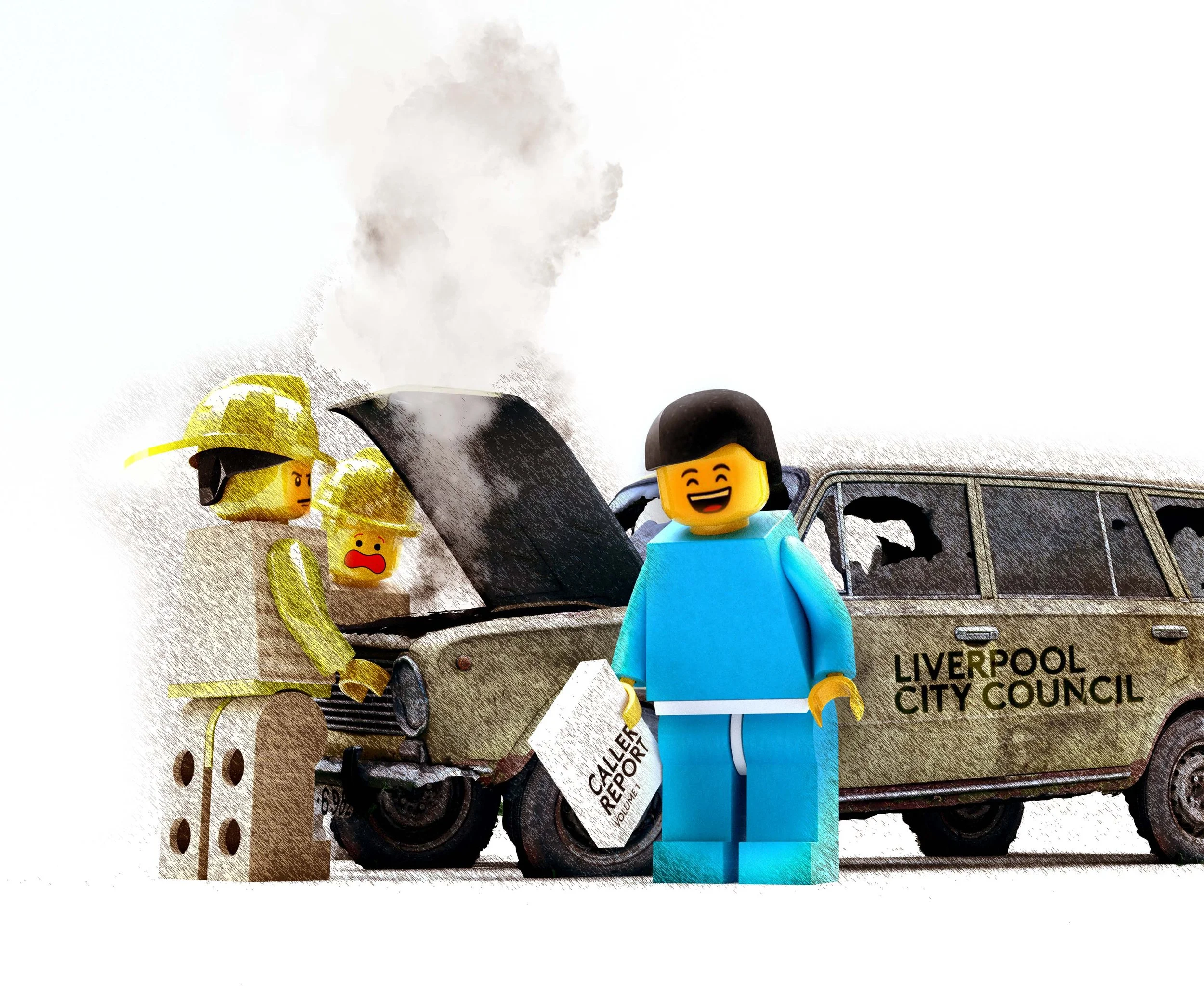Recent features
Mancpool: One Mayor, One Authority, One Vision?
Should the city of Liverpool throw in its lot with Manchester and accept one combined North West Metro Mayor to rule us all? Despite admitting that such a suggestion is about as saleable as a One State Solution for Israel-Palestine, Jon Egan thinks it’s an idea whose time has come. It’s certainly an idea that’s provoked some debate within Liverpolitan Towers. But what do you think?
Jon Egan
Manchester Bees Meet Liverpool Super Lambananas by mmcd studio
Is it time the city of Liverpool threw its lot in with Manchester and accepted one combined North West Metro Mayor to rule us all? Jon Egan thinks so. As you can imagine, the suggestion has caused some debate in Liverpolitan Towers and we are not all in agreement. But what do you think? Here Jon makes his case and hints at future initiatives to come…
So let me issue a warning now. This article contains material that many Liverpudlians will find deeply distressing and offensive. It’s an argument that I have tentatively proffered in the past, but after profound and serious reflection, have concluded, now needs to be set out in the most explicit and uncompromising of terms. You have been warned.
David Lloyd’s recent article for The Post lamenting the exodus of Liverpool’s “best and brightest” was as ever an enlightening and enjoyable read, notwithstanding its downbeat and dispiriting narrative of civic and economic decline. If I can add a generational postscript in support of David’s thesis, every member of our youngest daughter’s friendship group from Bluecoat School now lives and works outside Liverpool.
It was the nineteenth century philosopher, Friedrich Nietzche who argued that only as an “aesthetic phenomenon” does the tragedy of human existence find its eternal justification, and perhaps it’s only in the exquisite prose and imaginative virtuosity of David’s writing that Liverpool’s own tragic predicament becomes philosophically palatable. I admire David’s resolute determination to find some tiny component of hope, offered in the city’s joyously ephemeral hosting of Eurovision 2023. But does our capacity for celebration, hospitality and togetherness provide the alchemy for a viable economic renaissance? Does it, at best, illuminate Liverpool’s status as a half-city, stripped of its economic and productive assets, now reduced to the sheer potentiality of its human capital?
The idea of Liverpool as a stage set for cultural spectacles and entertainment extravaganzas (hyperbolically described by the city’s cultural supremo, Claire McColgan as “moments of absolute global significance”), is a beguiling substitute for an actual economy, and an ability to offer a livelihood for the generations who continue to depart for more attractive and seemingly successful cities. It’s a vision that also reminds me of another of Italo Calvino’s magical realist parables in his masterpiece novel, Invisible Cities. Sophronia, the half-city of roller-coasters, carousels, Ferris wheels and big tops, where it is the banks, factories, ministries and docks that are dismantled, loaded onto trailers and taken away to their next travelling destination.
“I fully grasp the deeply heretical nature of this proposition. A ‘One State’ solution for the Liverpool and Manchester City Regions is about as saleable as a one state solution for Israel and Palestine.”
Two hundred years ago, the realisation that we were a half-city inspired Liverpool’s city fathers to contemplate a project that would have world-changing implications - a genuine moment of “absolute global significance”. Prior to the construction of the world’s first inter-city railway, every human journey between major population centres would be dependent on the locomotive capabilities of the horse. Railways were the harbingers of modernity, compressing time and space, and in this instance, connecting one of the world’s great trading centres with its greatest manufacturing hub. Umbilically conjoined, the two half-cities (the place that trades and the place that makes), became the nexus for Britain’s industrial and imperial prowess for the next hundred years.
If the railway brought Liverpool and Manchester closer together, recent decades have been dominated by a football-terrace inspired antagonism aimed at driving us further apart. Liverpool’s antipathy to our more affluent neighbour would seem also to betray more than a slight hint of jealousy, as our rival has greedily accumulated the trappings and status of regional capital.
Rather than resenting Manchester’s success or investing in a strategy of do-or-die competition, is there a smarter and mutually beneficial alternative? Is it time to re-imagine a more symbiotic relationship, that realises that for every British provincial city, the real competition is located 200 miles to the south?
Of course, this is not an original proposition. In the early noughties, Liverpool Leader, Mike Storey and his Manchester counterpart, Richard Leese signed their much lauded Joint Concordat - an agreement only marginally less shocking than the Molotov-Ribbentrop ‘Non-Aggression’ Pact of 1939 between Nazi Germany and the Soviet Union. The benefits were equally short lived. The agreement was conceived in the golden age of regionalism when under the aegis of John Prescott’s mega-ministry - the Department for the Environment, Transport and the Regions - levelling-up and rebalancing were not mere meaningless mantras but core political imperatives. For all its good works, the now defunct North West Development Agency, which once employed 500 people to drive the region’s growth, was more of a hindrance than an enabler for a serious rapprochement between the city’s two main economic players. Determined to uphold scrupulous neutrality between Liverpool and Manchester (it’s Warrington-base memorably described by broadcaster and musical impresario Tony Wilson as being located in the “perineum” of the North West), the agency was forged by a powerful Labour Lancashire mafia, with a brief to prevent and constrain the domineering tendencies of the two cities.
The ill-fated 2001 Joint Concordat between Liverpool and Manchester was only marginally more palatable than the Molotov-Ribbentrop Pact of 1939 which saw the carve up of Poland. Bundesarchiv, Bild 183-H27337 / CC-BY-SA 3.0
“The idea of Liverpool as a stage set for cultural spectacles and entertainment extravaganzas is a beguiling substitute for an actual economy.”
The Storey-Leese pact conceded Manchester’s status as regional capital, a painful admission of subservience that probably explains the reluctance of subsequent Liverpool leaders to pursue similar overtures. The Liverpool City Region and Greater Manchester devolution deals, and the election of “great mates” Steve Rotheram and Andy Burnham has seen little practical collaboration, beyond occasional media stunts and chummy get-togethers to compare their favourite home-grown pop tunes. Those who expected more than a Northern Variety Hall double act have thus far been disappointed by devolution projects intent on protecting sub-regional domains and denying the compelling reality of geographic and economic interdependence.
We’re two cities less than 30 miles apart, whose fuzzy edges and increasingly footloose populations are blind to civic boundaries that no longer delineate where or how people live, work and play. People are already beginning to see and experience the cities as a single urban place - we just need to dismantle some of the physical and administrative obstacles.
It is beyond farcical that train travel between the two city centres is only marginally quicker today than it was when Stephenson’s Rocket completed its maiden journey two centuries ago. At a pre-MIPIM real estate seminar a few years ago, a Liverpool property professional opined that the single biggest boost to Liverpool’s commercial office market would be a 20 minute train service to Manchester city centre. Who knows, it may even have been enough to persuade Liverpool-nurtured companies like the sports fashion-brand, Castore, to stay in a better connected city location instead of moving to our city neighbour (and taking 300 jobs with it). Questioning the benefits of a fully integrated single strategic transport authority to straddle the two city-regions, is equivalent to advocating the abolition of Transport for London and its replacement by two rival authorities with briefs never to talk to each other.
“Rather than resenting Manchester’s success or investing in a strategy of do-or-die competition, is there a smarter and mutually beneficial alternative?”
For those who ask what’s in it for Manchester, the answer is the well attested and quantifiable benefits of economic agglomeration - cost efficiencies, labour pooling, expanded markets, knowledge spill-overs… Whilst working for the think tank, ResPublica on a project to build the economic case for Liverpool’s connection to HS2, I was staggered to hear Manchester’s economic strategist Mike Emmerich admit that his city envied aspects of Liverpool’s asset-base. The hard and soft criteria by which urban theorists like Saskia Sassen measure the credentials of aspiring global cities, seem evenly dispersed between the twin cities of the Mersey Valley. We can’t match Manchester’s international transport connections, its media and knowledge clusters, but neither can they compete with Liverpool’s global brand, our cultural prowess, architectural grandeur and liveability offer.
If transport is the no-brainer, the wider benefits of agglomeration need to be systematically mapped and identified. The amorphous promise of a Northern Powerhouse can only be realised in physical space, and the contiguity of our two city regions make this the most viable location for a re-balancing project. If the North is ever to grow an economic counter-weight to London, then connecting the two closest jigsaw pieces together seems like a sensible undertaking. Whether its land-use planning or plotting economic development, investment and skills strategies, it’s nonsensical for the two city regions to be pursuing their respective goals in blissful oblivion of what is happening on the other side of an arbitrarily contrived line on a map.
Notwithstanding, its invaluable enabling role in gap funding development and infrastructure projects, the North West Development Agency was a political creation without underpinning logic or legitimacy. Were there ever any connecting threads of economic interest between Salford and Penrith? Wilmslow and Barrow-in-Furness? The Agency’s opaque governance, and its tortuous high-wire balancing act, placating a multiplicity of sub-regional agendas and interest groups, inhibited its ability to optimise the potential of the region’s two great economic engines.
So here comes the controversial bit. Pacts, concordats and convivial personal relationships are simply not sufficient to realise the potential of a new economic relationship between the two city regions - one that acknowledges that their respective asset-bases can be curated for mutual benefit. The only solution is a new governance structure - a devolution model with one Metro Mayor and one Combined Authority. I fully grasp the deeply heretical nature of this proposition, and the threat that it seems to pose to the identity and autonomy of a city that suspects it will be the junior player in any such arrangement. But are identities any more compromised in a ‘Twin City Region’ than they are within the current dispensation? St Helens, Sefton, Wirral, Wigan, Bolton amongst others would probably argue not. The integrity and jurisdiction of the respective city councils and other local authorities would not be compromised - we would only be pooling functions and responsibilities that are already acknowledged to be regional, and projecting them onto a bigger and less artificially contrived regional canvas.
“The only solution is a new governance structure - a devolution model with one Metro Mayor and one Combined Authority.”
Once upon a time, Liverpool and Manchester were authorities under the even more commodious administrative umbrella of Lancashire County Council, and as I‘ve mentioned, more recently, through the North West Development Agency, we were content to buy into the concept of a North West regional project conspicuously lacking any democratic accountability.
In a Twitter / X exchange with Liverpolitan a few weeks ago, I was asked to defend this joint governance proposition by pointing to a successful or established similar model elsewhere in the world. In the US, the twin cities of Minneapolis and St Paul, and of Dallas and Fort Worth, and the urban centres of the San Francisco Bay Area have come together in different ways to pool planning, transportation and economic development responsibilities. Closer to home, the Ruhr Regional Association in Germany exercises both a statutory and enabling role in areas including planning, infrastructure, economic development and environmental protection for the cities of Dortmund, Duisburg, Essen and Bochum. But even if there is no precise template elsewhere, should this be an inhibitor to the cities that built the world’s first inter-city railway, and that pioneered many of the most progressive advances in civic governance in the 19th and early 20th centuries?
In the absence of compelling practical arguments against the proposition, the most likely and persuasive objection will be that the mutual rivalry runs too deep, the antagonism is simply too intense and has festered too long. A ‘One State’ solution for the Liverpool and Manchester City Regions is about as saleable as a one state solution for Israel and Palestine. Maybe it’s an argument that requires a solution or a process rather than a rebuttal. In truth, antipathy is a quite recent addition to a history of rivalry that owes more than a little to the intensity of the competition between the country’s two most successful football teams. Exorcism perhaps requires a practical project, an enthusing collaboration that focuses on shared cultural attributes and ambitions. Somewhere not far away such an idea is maturing, but I will leave it to its progenitors to expand, perhaps on this platform, and maybe very soon.
Of course, there is another motive and spur for this idea which relates to the abject failure of governance within the city of Liverpool and the continuing inability of its dysfunctional political class to nurture or curate those incipient possibilities that so rarely reach fulfilment. The uprooting of Castore from Liverpool to Manchester is an instructive case study, but so too are the games companies, the biotech businesses, legal and insurance firms that have hatched in Liverpool and gone on to prosper elsewhere. Maybe we need governance less rooted in parochial politics and less constrained by cultural legacy. To borrow an analogy from Iain McGilchrist’s Divided Brain hypothesis, perhaps Manchester’s busy-bee utilitarianism and non-conformist pragmatism is the left hemisphere counterpoint to Liverpool’s wistful dreaminess (even our civic emblem is an imaginary being). Is it just possible that our divergent dispositions and outlooks are not actually a prescription for unending antagonism but the formula for a fruitful alchemy?
Jon Egan is a former electoral strategist for the Labour Party and has worked as a public affairs and policy consultant in Liverpool for over 30 years. He helped design the communication strategy for Liverpool’s Capital of Culture bid and advised the city on its post-2008 marketing strategy. He is an associate researcher with think tank, ResPublica.
Share this article
What do you think? Let us know.
Write a letter for our Short Reads section, join the debate via Twitter or Facebook or just drop us a line at team@liverpolitan.co.uk
The Beatles: Inspiration or dead weight?
When does city pride in the Fab Four turn into a hindrance to future achievement? Jon Egan argues that the city of Liverpool is in danger of becoming a Beatles theme park, and its world conquering band a crutch to exorcise the painful intimations of our diminished relevance and prestige. In looking to the past, have we forgotten what made John, Paul, George and Ringo so special - their fearless embrace of the avant-garde, the contemporary and the new?
Jon Egan
There was something profoundly true and desperately sad in University of Liverpool lecturer, Dr David Jeffery's acerbic observation that "Liverpool is a Beatles' shrine with a city attached."
It is the dispiriting obverse to music journalist, Paul Morley's rhapsodic description of Liverpool as "a provincial city plus hinterland with associated metaphysical space as defined by dramatic moments in history, emotional occasions and general restlessness."
Jeffery's comments on Twitter appear to have been inspired or provoked by the recent announcement that Liverpool would be using a £2 million grant from Government to advance the business case for yet another "world-class" and "cutting-edge" Beatles' attraction on our hallowed waterfront. Presumably, it will be sandwiched somewhere between the Beatles statue and The Beatles Experience and conveniently close to The Museum of Liverpool and The British Music Experience with their not inconsiderable collections of Beatles artifacts and memorabilia. The exact nature of this new cultural icon remains a little unclear, however, amidst wildly differing descriptions offered by our City and Metro Mayors.
What is deeply depressing about this announcement is that it suggests that Liverpool is incapable of imagining any kind of cultural proposition that is not predicated on the seemingly inexhaustible allure of the four boys who shook the world.
There is of course a readily available and seemingly plausible justification for the never-ending Beatles' fetish, and that is the claim that they are the anchor for our hugely important tourism economy. Notwithstanding the implication that David Jeffery is right to suspect that the city is consciously morphing into a Fab Four theme park, I suspect that this is not exactly the whole truth. For Liverpool, The Beatles are a crutch, a cherished emblem of identity and importance used to exorcise painful intimations of diminished relevance and prestige.
In the novel, Immortality, Czech writer Milan Kundera tells the story of the man who fell over in the street, who on his way home stumbles on an uneven pavement, falls to the ground and arises dazed, grazed and dishevelled, but after a few moments composes himself, and gets on with his life. But unbeknown to the man, a world famous photographer happens to witness the scene and quickly snaps an image of the bewildered and bloodied pedestrian. He subsequently decides to make this picture the cover image for his new book and the poster for his international exhibition. For the man, a momentary misfortune freeze-framed, replicated and disseminated across the world, becomes the image that will forever define who he is.
The more we conflate the Beatles brand with the city's identity, the less space we have to imagine anything original, contemporary or remarkable.
In a sense, Liverpool is the City that fell over on the street, our external image is in significant part, defined by a succession of misfortunes, afflictions and tragedies that befell the city over two decades at the end of the last century. These events forged images, preconceptions and stereotypes that still blight us today and have never been successfully exorcised or replaced.
The Beatles hark back to a time before this blight, when Liverpool was in Alan Ginsberg's celebrated phrase, "the centre of consciousness of the human universe." They are, I believe, a therapeutic distraction from the task of making a different story or discovering a new identity.
Culturally, our Beatles fixation is unhealthy, debilitating and regressive. In fact, I fear we are reaching a point where The Beatles will become the single biggest impediment to any form of civic progression, or any serious project to make Liverpool important, interesting or relevant in today's world. If we are going to have a civic conversation about what kind of "world class" Beatles attraction should be erected at The Pier Head, my immediate impulse would be to recommend a mausoleum.
But perhaps a more imaginative and original idea was the one offered by the late Tony Wilson. That supreme Mancophile, Factory Records producer, Granada TV reporter and founder of the Hacienda nightclub was never held in particularly high regard in this city, especially following some tongue in cheek words of encouragement he gave to Club Brugge on the eve of their European Cup semi-final with Liverpool in 1977. Scousers may resemble elephants with respect to their prodigious powers of memory, but our skins can sometimes be just a tiny bit thinner. Tragically, Wilson's Mancunian persona and his tendency to lapse into casual profanity whilst presenting his project to civic decision-makers proved the undoing of his brilliant and visionary proposition for POP - the International Museum of Popular Culture. Pitched as the big idea for the European Capital of Culture, and the solution that would provide content for Will Alsop's audacious but otherwise functionless Fourth Grace, POP was a talisman for instant reinvention - a Beatles-inspired attraction without any reference to The Beatles. Alas it never happened.
Wilson had first dreamt of POP as an adornment for his own native city and a fitting celebration of its notable contribution to the history of modern popular music, but he soon realised that it was the right idea for the wrong place. He would often express irritation that when travelling in the US he would frequently have to explain where Manchester was by reference to its proximity to Liverpool - a place that people had actually heard of. And there was also the grudging recognition that at a time when Liverpool was "the centre of the human universe" globalising popular culture - Manchester could only offer us Freddy and The Dreamers. Even the outrageous charisma of Manchester United football god, George Best was derivative as he was often dubbed the 5th Beatle.
POP would not simply have been about popular music, it would encompass every facet of popular culture, every expression of contemporary creativity in film, TV, advertising, games, cars, sport, fashion, digital technology and consumer culture. And it was proposed for Liverpool because this was the place that spawned a phenomenon that reached the four corners of the Earth. It was a moment when the world discovered a common currency and a cultural vernacular intelligible to every ear.
POPs content would be dynamic and ever-changing, a continuous exposition of the new, curated by global creatives, designers and technologists. It would be Liverpool recovering its world city perspective and its capacity to invent and innovate - the pool of life, the birth canal for the extraordinary and the unprecedented. Its ingenious paradox was its implicit assertion that The Beatles did not make Liverpool, but Liverpool made The Beatles.
They monopolise our self-image occluding facets of identity and history now only half-glimpsed in the penumbra of a shadowy scouse dreamtime.
All of which is a million miles from Steve Rotheram's "world-class immersive experience" which he promises us will be more spectacular than a glass cabinet containing John Lennon's underpants. We can hardly wait.
If all we can possibly imagine are The Beatles etherealised into holograms - almost literally spectres from beyond the grave - then David Jeffery is right and Liverpool's once rich and cosmopolitan culture has collapsed into a black hole of redundant clichés. The more we inflate our Beatles offer and conflate their brand with the city's very identity, the less space we have in which to imagine anything original, contemporary or remarkable. Along with football (which at least tells new stories) they have come to monopolise both our external brand and our officially curated self-image, occluding facets of our identity and history that are now forgotten and suppressed, only half-glimpsed in the penumbra of a shadowy scouse dreamtime.
The Beatles have come not only to represent our brand, but have also helped to define our personality, attitude and accent - cheeky, chippy, sassy and defiant. As emblems of the 60s social revolution, they helped to forge and reify the idea of Liverpool as a working class city - or more accurately an exclusively working class city. As rock journalist Paul duNoyer, notes in his book, Wondrous Place, this is both a false and profoundly disabling imposition. Not only, as Tony Wilson asserted, are we the city that globalised popular culture, but we are a city that has contributed massively to every facet of culture, ideas and invention over the last 200 years.
The world's first enclosed dock and inter-city railway, together with the completion of the Transatlantic telegraph cable, are not only stunning achievements in technological innovation, but bolster the credible claim that globalisation began here.
The extent to which we have been willing to squander or disown the breadth of our cultural heritage was brought home to me in the febrile final stages of the European Capital of Culture bidding competition. Having commissioned pop artist, Sir Peter Blake to create a homage to his iconic Sgt Pepper album cover to remind the world, or at least the judging panel, of Liverpool's cultural and intellectual prowess, the task of deciding who exactly was worthy of inclusion was both fraught and enormously revealing. Apart from a few contemporary, and at the time highly topical creatives including the poet Paul Farley, artist Fiona Banner and film-maker Alex Cox, the principal criterion for inclusion appeared to be the directness or intimacy of connection to The Beatles. A lop-sided bias towards musicians, popular entertainers and Sixties icons meant no room for the likes of painters George Stubbs and Augustus John, poets Nathaniel Hawthorne and Wilfred Owen, novelist Nicholas Monsarrat, playwright, Peter Shaffer or even poet and novelist, Malcolm Lowry the author of the celebrated, Under the Volcano. Incredibly, until Bluecoat Artistic Director, Bryan Biggs' finally succeeded in persuading Wirral Council to erect a blue plaque on New Brighton's sea wall, there was virtually no public recognition that one of the 20th century's greatest and most influential novelists had any association with the Liverpool City Region.
Without questioning or diminishing the impact of the Mersey Sound poets (McGough, Henri and Patten) in the 1960s, their literary status is no way comparable to another unsung and forgotten cultural luminary with a significant Liverpool connection - C.P. Cavafy. Now acknowledged as one of the last century's most important and original poetic voices, Cavafy spent much of his childhood at addresses in Toxteth and Fairfield. Greek and gay, his poetry will forever be associated with the city of Alexandria where his family settled after leaving Liverpool. We do not know to what extent his formative years in the city helped nurture Cavafy's creative animus, but transience, up-rootedness and departure are woven into our narrative. Our sense of self and place in the world as Liverpolitans, owe as much to those who moved on, or merely passed through, as they do to those who stayed or settled here.
We are not, and never have been a monochrome canvass or a one trick city. Our culture is dense, deep and multifarious, formed by a hotchpotch of races, creeds and classes. For those tasked with defining a place and communicating its uniqueness to the world, there is always the temptation to reduce and simplify.
Brands, including place brands, are often conceived like Platonic forms - a distilled essence, fixed and immutable. But cities like Liverpool are neither simple nor static, and are thus frustratingly un-brandable. Described by Wilson as a place with "an innate preference for the abstract and the chaotic," our essence is pre-Socratic - unresolved, unpredictable and disconcerting. We know that port cities like Liverpool, Naples, Barcelona and Marseilles have historically been melting pots for ideas, influences and cultures - places where things never quite settled.
But their edginess is not merely a function of a perturbed diversity, it is also literal. It's connected to Marshall McLuhan's philosophical idea of right hemisphere sensitivity and the expanded perspective of what he terms acoustic space. Ports face outwards, they are perched on the precipice of a vast and formless abyss. It's an omnipresent reminder that there are no limits.
For Paul Morley, Liverpool’s character and identity - its ability to charm, entertain, inspire and infuriate - proceed from an inchoate restlessness and fidgety creativity. It's a place "where something happens, most of the time, leading to something else." But it seems like that creative energy and inventiveness have deserted us - or at least our leaders. What was once an animating pulse has been reduced to a piece of hollow rhetoric - a brand attribute.
It's sad that a UNESCO City of Music should have forsaken polyphony, and that we are continually stuck in a repetitive groove, narrowing our identity and stifling our capacity to be original (again). For this reason the very last thing Liverpool needs is yet another Beatles' attraction, even an immersive one.
So, OK, The Beatles were important, are important. They changed the world, but did they change Liverpool? We're still, I hope, the city capable of creating something else.
Jon Egan is a former electoral strategist for the Labour Party and has worked as a public affairs and policy consultant in Liverpool for over 30 years. He helped design the communication strategy for Liverpool’s Capital of Culture bid and advised the city on its post-2008 marketing strategy. He is an associate researcher with think tank, ResPublica.



